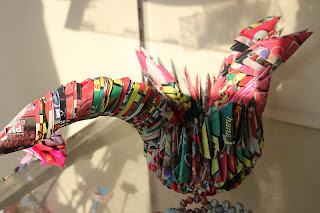Wednesday afternoon found me in a van full of newspapers and magazines driving to one of the poorest areas in the city. As we drove from work to Smokey Mountain, buildings changed from massive clean, solid structures, to small dreary shanties made up of a hodgepodge of used materials that looked like they would all blow over if a strong wind picked up. I watched the people going about their daily activities, washing clothes in a large tub, selling bananas, resting in the shade after a long laborious day, carting building materials or chasing children. Life is so different.
Inspired by my last trip to Smokey Mountain—a community of people that live on the old trash pile that is literally a mountain—I proposed to the United States Embassy Club (USEC) that we do a magazine and newspaper drive to donate to Gawad Kalinga, one of the large charities out at Smokey Mountain.
 |
| Part of Smokey Mountain...that is years and years of trash... |
Gawad Kalinga has projects all over the Philippines. They do work similar to what Habitat for Humanity does in the United States. Out at Smokey Mountain they are especially effective. Smokey Mountain gets its name from the smoky smell. Once trash is dumped from the very crowded city of Manila, people sort through it to find anything of value: food, metal, plastic, etc. The rest is burned. There is a large community build on the area. Being a developing country, there are many poor socio-economic areas in Manila, but Smokey Mountain is one of the poorest.
Families do not make enough money collecting and recycling garbage that they find and need to supplement their incomes to survive—or they have to go without. This is where Gawad Kalinga comes in. The charity has a few buildings on Smokey Mountain. One large building is an afterschool day care where volunteers care for over 800 children who would normally be home alone after school while parents work. One of the other buildings just recently donated and finished by JCI Manila is a pharmacy and doctors office, where medical professionals come out and donate time and resources to people that need it but simply cannot afford it.
One of the projects that Gawad Kalinga has is a form of what I want to call creative recycling. Scraps of clothing are donated and women spend hours at sewing machines making hot pads, mats, and other cloth projects that are then sold on the streets to passing cars. They even showed us new baseball uniforms they had made for their prized, tournament winning team, all out of donated materials.
They take tarpaulin signs and empty juice bags (like Capri-sun) and cut them up and make stylish bags. They use magazines and newspapers to make jewelry, baskets, lamps, origami animals, and many other gifts. These are then sold all over the city. Gawad Kalinga gives a portion of the proceeds to the loving mother that created the project so she can buy food or clothing for her children. Then they use the remaining money to buy more medicine or school supplies for the community. Gawad Kalinga refers to it as a “sustainable program” because it is helping people provide for themselves.
 |
| Some of the jewelry made out of magazines and newspapers |
 |
| Newspaper beads |
For one month colleagues at work collected and donated all their newspapers, magazines and wrapping paper to donate to Gawad Kalinga’s project. We literally filled a large industrial sized van with paper products—packed full with no seats inside either! As we arrived people from all over the community came to help us unload the magazines and newspapers. One of them commented, “This will last us a whole year!” The children even came to help and in return they wanted to have their picture taken or to keep the glossy toy advertisement section of the newspaper to look at.
After unloading all the magazines we were given a tour of where they make all of the crafts and their little store that displays what they sell.
One thing that hit me over and over is how happy everyone was. Yes, they literally live in a dump and have to work tirelessly to have food on the table each night, but they were happy; happy to share with us, happy to talk with us, happy to laugh with friends and family. Driving back to work in the City I watched the people again who were sorting through piles of trash trying to discover that “perfect find” before someone else did and I was reminded how blessed I was. I was also humbled again to realize many of my ‘needs’ are not really needs at all. I have enough and to spare…something to keep in mind.





















That is so cool what you are doing!
ReplyDelete